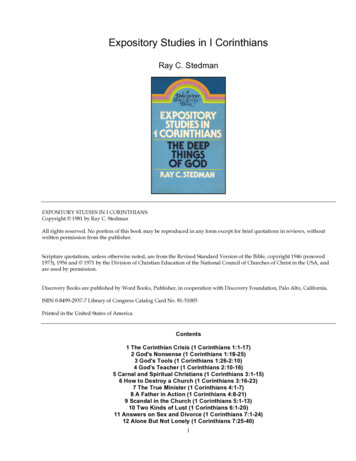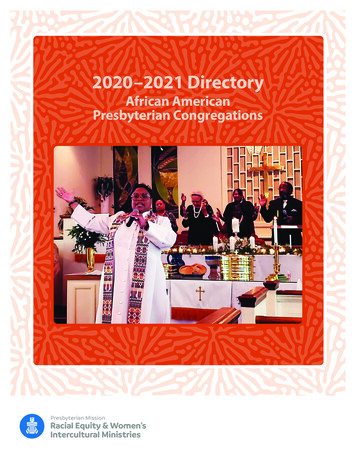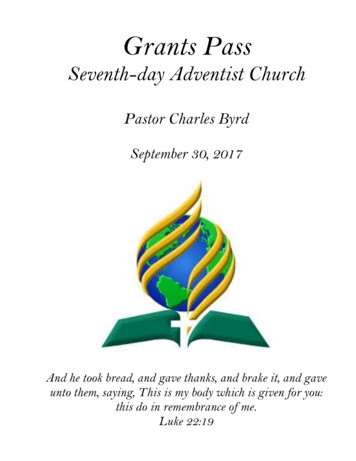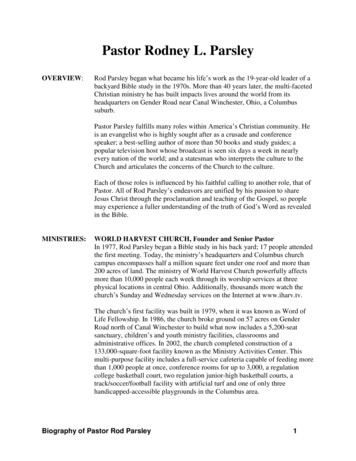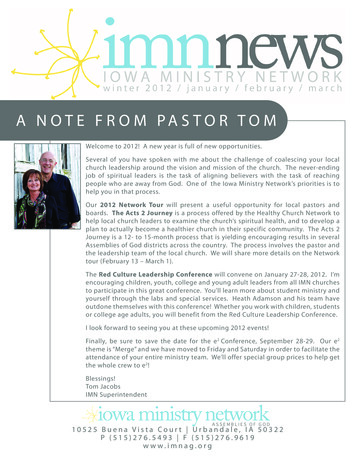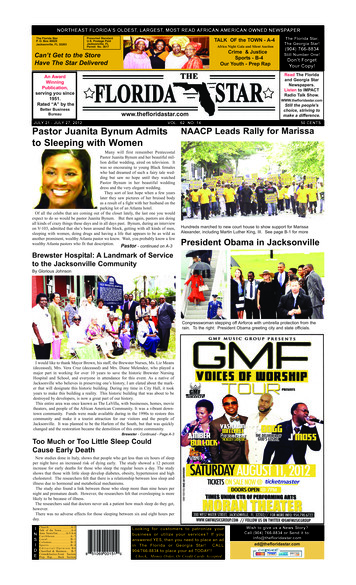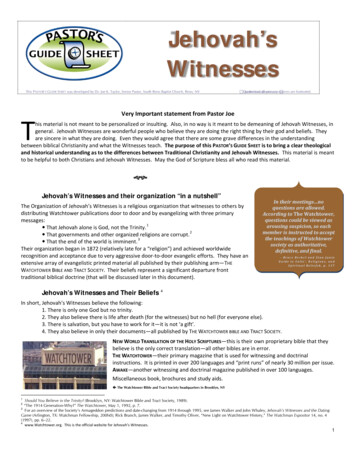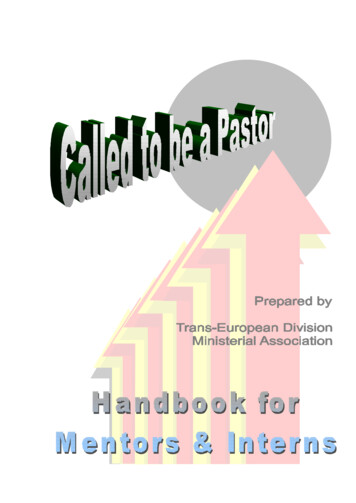
Transcription
Handbook for Mentors & InternsWho is Mentor?A Mentor is an experienced pastor/evangelist who has beenassigned the responsibility of guiding a pastor through his/her first twoyears of pastoral ministry as an intern. The mentor is chosen becauseof his/her experience in the basic roles and functions of ministry;positive attitude to the potential of young people; ability to teach, guideand equip; and confidence in the church and its leadership.Why a Handbook for Mentors & Interns?Both the conference leadersand the intern have certain expectations of the guidance, experiences,education and direction that the intern will receive when enteringpastoral and evangelistic ministry. This manual is designed to be thebasis for a discussion of those expectations and how to facilitate thegrowth and development of the pastor.Who is an Intern?An intern is a pastor, in the first two years ofpastoral/evangelistic ministry, who is receiving mentoring andsupervision from an experienced pastor/evangelist.Why Internship?It is not possible for any college to provide the total educationthat is necessary for preparation for pastoral and evangelistic ministry.Therefore colleges and conferences recognise that the basic educationprovided - including the practical components - is only part of thepreparation for pastoral-evangelistic ministry. Colleges thereforeprepare students for the fact that upon graduation they will enter aninternship with a supervising pastor and mentor.What is our commitment to Internship?Although most unions andconferences work within the constraints of limited finance, it is recognisedthat for the future morale, professionalism and effectiveness of our pastorsand their oversight of growing churches, all graduates who enter pastoralevangelistic ministry need mentoring and guidance. Therefore, all unionsand conferences within the Trans -European Division have made acommitment to follow the two-year Internship Plan.This means that every person called into pastoral/evangelistic ministry shallreceive mentoring and supervision for two years. Limited budgets shall notbe permitted to deprive an intern of this experience for development - and,the executive committees should be prepared to leave assignments unfilledrather than deny interns this basic preparation for pastoral and evangelisticministry. Every person entering pastor/evangelistic ministry will be assignedto work under the supervision of an experienced, ordained or commissionedpastor who shall be the intern’s mentor. Working as an assistant pastor, witha Missionary License, the intern shall be provided with support and a broadrange of experiences and education for pastoral and evangelistic ministry.Called to be a Pastor!1
An Overview1. THE BIBLICAL ROLE OF THE PASTOR 3ØØØEvery member is a minister 3Pastors are ministers called to a specific task 3What is the biblical role and function for which the intern is being equipped? 42. UNDERSTANDING INTERNSHIP 6ØØEducating for this Vision 6Internship is a part of preparation for ordination or commissioning 7ØUnderstanding the guidelines (policies) for internship 73. UNDERSTANDING AND SUPPORTING THE NEW GENERATION 94. A GROWTH JOURNEY 11ØAssignments and opportunities - for the intern 12ØSupervising and supporting - by the mentor 14ØØManuals and handbooks! 15Who should the intern be at the end of two years? 155. AFTER INTERNSHIP 15ØØØThe next 2-6 years! 16Preparation for Ordination or Commissioning 16Those ready for ordination or commissioning will be characterised by . 19APPENDIX A 20Guidelines for the Implementation of GC Policy relating to Licenses andCredentials for Pastoral Employees in the Trans-European Division 20APPENDIX B 24Continuing Education - Guidelines for Pastors Administrators & BibleWorkers 24.Called to be a Pastor!2
1. THE BIBLICAL ROLE OF THE PASTORØ Every member is a ministerGroup discussionEvery believer in Jesus Christ is calledto ministry. (2 Corinthians 5:17-21)Each member of the body of Christ, whois baptised by the Holy Spirit, receivesspiritual gifts for this service.(1Corinthians 12:1-13) As an example,the apostle Paul was anointed by theHoly Spirit for ministry as a member ofthe body of Christ at the time of hisbaptism.(See Acts 9:17-20; cf.8:14-17.) Then there were years ofpreparation before he was ordained as anapostle and evangelist to equip believersfor ministry.(See Acts 13:1-4;Ephesians 4:11-13.)1. What are the ministry implications of theteaching that all members are ministers?2. How do we prepare new converts for theirministry?3. When are new believers anointed for theirministry?Ø Pastors are ministers called to a specific taskSome believers are called by the Holy Spirit to be apostles, prophets, evangelists,pastors and teachers. They do not have a higher status over other believers. Rather,their primary role is to equip the other believers for their ministry according to theirspiritual gifts. (Ephesians 4:11-13; 1 Peter 2:9) So as to be able to equip others, theyare to be highly skilled through education and experience in ministry. (See 1 & 2Timothy and Titus.)The history of the Seventh-day Adventist Church has demonstrated that the church hasbeen most vibrant during the decades when pastors have planted sustainable churches,educating and equipping members for ministry according to their spiritual gifts. Thepastor's primary task is to model and teach members how to minister according to theirgifts. The idea of members paying pastors to minister for them is not biblical - and,was foreign to early Seventh-day Adventists.Group discussion - Mentors1. What processes do you use to equip members for their ministry?2. How will we guide our interns to become skilled in equipping members for ministry?.Called to be a Pastor!3
Ø What is the biblical role and function for which the intern is beingequipped?To respond to the vision presented by the biblical expectation that the pastor/evangelistis a teacher of members - equipping them for ministry - we want to equip our interns tobe:1Pastors who have a heart forlost people. Along with members, thepastor will develop relationships,ministries and programmes that carefor people, meet their needs and leadthem to Jesus Christ. Ministry ispeople centred - rather than technologyor programme centred. People withoutJesus Christ are lost. People who knowJesus Christ have life.2Pastors who pray and readtheir Bibles. Although pastors should notgive the impression that they arespiritually superior to others, they are tobe spiritual leaders and models. From thepractical experiences of nurturing theirown spiritual lives through prayer,reflection, Bible reading and theologicalstudy pastors will be able to guide andinstruct others in Christian living.3Pastors who value and lovetheir families.Very little can beaccomplished by a pastor who has anunhappy family. Today, people wish tosee that Christianity makes a difference.4Pastors who are leaders - with asense of vision.Pastors with a clearunderstanding of their role will have a sense ofidentity. They will have the gift of leadership with the ability to motivate, organise and guidepeople towards common goals. They willhave a clear vision of the difference Godmakes in a person's life. As shepherds, pastorswill cultivate a caring spirit.5Pastors who are practical andwell prepared for their task. Thepastor's practical ministry of educatinghis/her members to minister according totheir spiritual gifts will be based upon ahigh-quality theological education thatrecognises this primary role.6Pastors who are doing thework of pastors - and not only that oflaity. Members are ministers - involvedin building relationships, visitation andBible readings, sharing their love forJesus, counselling, leading worship,preaching, evangelising, witnessing, etc.The primary work of the pastor is toeducate and equip laity for their specialministry.7Pastors who build strongcommunity relationships. To be partof the community the pastor and churchmust listen to and participate in the lifeand needs of the community. The pastorwill model close relationships with peoplein the community - and, equip his/hermembers to minister in their communities.8Pastors who are teachers evangelising, discipling and multiplyingchurches. It is the business of a teacherto make learning take place. This canhappen through mentoring and classwork.The development of a pastor must includeeducation as a teacher, for his/her primaryrole is to mentor, nurture, train andeducate members for their ministry.9Pastors who can give a clearpublic witness and presentation ofthe gospel. Some pastors will havespecial gifts for public evangelism.However, every pastor needs someskills in publicly presenting the gospelto modern people.Group discussion1. What would be the implications for your church if you really did the work of a pastor - andnot that of the laity?.Called to be a Pastor!4
Group discussion2. Discuss the implications ofthe following counsel andstory told by Ellen White inGospel Workers, pp. 197,198.3.How will you guide yourintern so that he/she becomesa true equipper of membersfor ministry - rather than onewho does all the ministry?What will this mean about thekinds of assignments yougive - and how the intern willcarry them out?”In some respects the pastoroccupies a position similar to that of theforeman of a gang of labouring men orthe captain of a ship’s crew. They areexpected to see that the men over whomthey are set, do the work assigned to themcorrectly and promptly, and only in thecase of emergency are they to execute indetail.””The owner of a large mill oncefound his superintendent in a wheel-pit,making some simple repairs, while a halfdozen workmen in the line were standingby idly looking on. The proprietor, afterlearning the facts, so as to be sure noinjustice was done, called the foreman tohis office and handed him his dischargewith full pay. In surprise the foremanasked for an explanation. It was given inthese words: ‘I employed you to keep sixmen at work. I found the six idle, andyou doing the work of but one. Your workcould have been done just as well by anyone of the six. I cannot afford to pay thewages of seven for you to teach the sixhow to be idle.’””This incident may be applicablein some cases, and in others not. Butmany pastors fail in not knowing how orin not trying, to get the full membershipof the church actively engaged in thevarious departments of church work. Ifpastors would give more attention togetting and keeping their flock activelyengaged at work, they would accomplishmore good, have more time for study andreligious visiting, and also avoid manycauses of friction”. -- Gospel Workers,pp. 197, 198.Called to be a Pastor!5
2. UNDERSTANDING INTERNSHIPØ Educating for this VisionWhen a person becomes a believer - that person is called to ministry as a member.This should not be confused with the call that may come to be a pastor/evangelist - thatis, one who is called to equip members for ministry according to their spiritualgiftedness.It is expected that a person will be active as a member/minister in the local churchbefore being called to be a pastor. A number of fields have suffered the consequencesof having new believers go straight to seminary before they have any experience inministry. They have never shown any commitment or skill in visiting, giving Biblereadings, leading people to Jesus, building people spiritually - they have never beenequipped for ministry as members. Some have entered their work as pastor/evangelistswith less knowledge of how the church operates and how to do ministry than the mostpoorly equipped member in the pew.A number of steps are needed to educate pastors so that they are skilled andexperienced in producing reproducible churches - planting new churches and educatingmembers for their ministry. These include:1.A pastoral and theologicaleducation at college.Newbold College also offers a graduateor Masters programme.Various levels of basic education forthe pastor are provided by the sevenUnion and Conference colleges BelgradeTheologicalSeminary,Croatian Adventist Seminary, MiddleEast College, Pakistan AdventistSeminary, Polish Spiritual Seminary,Hungarian Theological Academy andthe Sudan Adventist Seminary.Our pastor education programmes aredesigned to prepare people, at theundergraduate level, as pastors,evangelists, preachers, church plantersand administrators who can teach theHoly Scriptures and equip members fortheir ministry; and, to prepare them atgraduate level for more specialisedfunctions of directing, teaching,expansion and evangelism.Newbold College presently offers theBAPS programme as their basicministerial education pr ogramme. Thisprogramme, which is accreditedthrough the British Open University, ismore versatile than the previous BAprogramme, which was based on theAmerican liberal arts tradition.2.A supervised and coordinated preparation for ordinationor commissioning which will include:iInternship (2 years).iiExperience as Pastor/Evangelist (2-6 years).Group discussion1. Discuss the Newbold BAPS programme - and be fully familiar with the course outlinecovered by the intern.2.Discuss and understand the Newbold College Off Campus: Pastor Education Programme.Called to be a Pastor!6
Ø Internship is a part of preparation for ordination or commissioningThe Seventh-day Adventist Church does not ordain or commission its pastors upontheir graduation from college or seminary. The work of the pastor is seen as more thana profession - that it is, in fact, a calling from God - and that the individual shoulddemonstrate that calling prior to receiving the sacred rite of ordination orcommissioning.Therefore, an extended period of four to eight years has been developed to enable eachpastor to both learn and develop skills as well as to practice and to demonstratecapabilities in fulfilling those functions necessary for pastoral/evangelistic ministry.Thus it is expected that each pastor will be able to understand his/her own commitmentto pastoral ministry and to demonstrate his/her calling prior to ordination orcommissioning. The first two years of this period are the internship years.Ø Understanding the guidelines (policies) for internshipAll Unions and Conferences within the Trans-EuropeanDivision shall follow the two-year Internship Plan. Everyperson called into pastoral/evangelistic ministry shallreceive mentoring and supervision for two years. Limitedbudgets shall not be permitted to deprive an intern of this experience for development and, committees shall be prepared to leave assignments unfilled rather than denyinterns this basic preparation for pastoral and evangelistic ministry. InternshipPlanEvery intern will be assigned to work under the supervision of an experienced,ordained or commissioned pastor who shall be the intern’s mentor. Working as anassistant pastor, with a Missionary License, the intern shall be provided with supportand a broad range of experiences and education for pastoral and evangelistic ministry. Co-ordinationby MinisterialAssociationSecretaryThe Ministerial Association Secretary is responsible formanaging the internship programme. The details of theinternship programme for each Conference will bedetermined by the Union Ministerial Training AdvisoryCommittee (MinTAC), and shall include:1Advice on the selection of mentors/supervisors, and the churches andevangelistic opportunities that will provide for the education, experience, anddevelopment of each intern.2The process to be used for mentoring. Interns may have one supervisor for thetwo year period or a different one each year - to facilitate the total experienceof development and training.3A prescribed orientation programme of 3-5 days for the intern and mentor atthe beginning of each internship.4Opportunit ies for interns to have input into the process and to provide feedbackon perceptions of weak and strong points.5A network of experienced mentors and providing support and regular trainingopportunities (at least every second year) for them. Mentors will beexperienced pastor/evangelists who are positive, see potential in young people,and have confidence in the church and its leadership.Called to be a Pastor!7
While the intern is ultimately accountable to theConference which employs him/her, and while there is adirect line relationship between intern and ConferencePresident, in his/her training and working relationshipwith the local churches the intern is first of all accountable to the supervising pastorand should expect to devote all energies and talents toward strengthening theprogrammes and plans of those congregations within the guidelines worked outbetween the intern, the supervising mentor and the Conference. Opportunities&AccountabilityThe intern, with a Missionary License, is authorised to preach, engage in evangelism,lead out in missionary work, and assist in any church activities. The Conference shalltake the initiative to arrange with the local church for the intern to be elected andordained as a local church elder at the earliest possible time. This will make it possiblefor the intern to fulfil the full duties of a local church elder to the church andcommunity. As an ordained elder of a local church the intern is authorised to lead inthe services of the Lord’s supper - and, may assist the supervising pastor in baptismsand marriages.The leadership progress, professional development,skills as an equipper of members for ministry, and thespiritual growth of the intern will be reviewed annuallyby the conference - and reports made to the Union andDivision Committees. This annual review, which shall take place before the end ofeach year, shall also assess progress in fulfilling the Internship Assignments. Theauthorisation of an intern to serve as an employee may be withdrawn by a conference. Annual ReviewUpon the successfulcompletion of theInternship programme,the intern shall receivea Ministerial Practicum diploma. Group discussionCompletion1.To foster a balancedpastoral/evangelisticministry the intern isexpected to fulfilcertain assignments.Some of these assignments will involve discussionsbetween the mentor/supervisor and intern. Otherswill involve practical work. Some will be coveredin workshops - or, require the assistance ofConference personnel. (See the section entitled AGROWTH JOURNEY and the Ministerial Internsand Intern Supervisors Manual for greater detail.) InternshipAssignmentsDiscuss and understand the policydetails for the issuance of aMissionary License, a MinisterialLicense, an Ordained MinisterialCredential, a Commissioned MinisterLicense, and a CommissionedMinister Credential. (See AppendixAGuidelinesfortheImplementation of GC Policy relatingto Licenses and Credentials forPastoral Employees in The TransEuropean Division.)2. Discuss and list actions that you needto take to facilitate the intern’s growthin harmony with these policies.Called to be a Pastor!8
3. UNDERSTANDING AND SUPPORTING THE NEWGENERATIONPastors are part of a new generation that cannot be categorised. When endeavouring tounderstand this new generation, it is important that we are careful not to generalise.Therefore, the following points should simply be used as a starting point for discussion. Discuss some characteristics of the new generation:1. The options generation1They love choices and have been raised on change - and have trouble when there are nooptions and an unwillingness to adapt.What are the implications? What types of churches will really motivate such pastors?What about their potential as church planters?2. Truth is seen as relative2This impacts the learning style of this generation - including the many of the new generationof pastorsWhat are the implications for doctrinal understandings and approaches to evangelism? Howwould you relate to a pastor who sees truth in different terms to you?3. Individualism versus community3On the one hand there is a desire for meaningful relationships and community - but, onthe other hand, a hesitancy to make commitments.Discuss ways in which this tension may result in the new generation of pastorsapproaching their ministry differently.Called to be a Pastor!9
4Cynicism and disillusionmentThe new generations are particularly cynical of baby boomers who are taking over thechurch. The baby boomers have always believed they had the answers. Unfortunatelythey also think they have the answers for the new generation.Spend time listening to the questions and challenges - and the solutions offered by thepastor. They need to know they are being listened to. This generation will rarelyprotest. They will just leave. This generation of pastors need to know that they arebeing taken seriously. They are on the whole better educated than previous generationsand need to be able to feel that they are making a difference.5Post-modernism, anti-institutionalism & post-denominationalism.How do we help our pastors stay Adventist and yet build churches that are seen to berelevant to people that accept conflicting ideas as truth and see denominationalism asirrelevant?6CommitmentPeople today will commit to causes that they see will impact their lives.What causes does the intern pastor believe would make a difference?7Technology.What technological skills does the intern have - that could make a positive contributionto outreach and church?8Broken and blended familiesWhat has been the family background of the intern and mentor? What may be some ofthe challenges and stresses for the intern/mentor pastor or spouse who has beenpreviously married (maybe with another family)?.Called to be a Pastor!10
Further questions for discussion by interns and mentors:1. How will mentors relate to an intern whose spouse also has a career (eg. doctor,lawyer, accountant, etc)? What issues may need to be addressed with transfers,involvement (rather than simply support) in ministry?2. In that traditional support systems (such as Shepherdess International) have lessappeal to the new generation, what types of support are they saying they wouldappreciate?3. How do you deal with criticism of your pastor husband/wife? In whom can youconfide? What sort of support network is there for this without the pastor orspouse being seen as weak by the administration?4. Discuss the need for skills to cast vision and provide leadership. What styles ofleadership will generate growth and co-operation? What skills are needed to be avisionary chairperson? How do you generate vision in your church?5. Most pastors of the new generation are very passionate about the local church andits centrality to the mission of the church. Discuss the issues of resources, wagesand recognition of the local pastor in comparison to other levels of the church.How can conflict in this area be handled?6. What are the expectations of mentors and interns for family/personal time andprivacy? What will be the guidelines and boundaries?7. Discuss the issues regarding studies, visits or counselling of the opposite sex.4. A GROWTH JOURNEY.Called to be a Pastor!11
Ø Assignments and opportunities - for the internTo foster a balanced pastoral/evangelistic ministrysome of these assignments will involve discussionsbetween the mentor/supervisor and intern. Otherswill involve practical work. And, some will becovered in workshops - or, require the assistance ofConference personnel.It is the mentor’sresponsibility to guide the intern along this growthjourney.Group discussion1. Examine each of the followingassignments and opportunities anddiscuss how you will help your intern togrow in each area. When consideringeach growth area, clarify ”who” willprovide the intern with the guidance/instruction needed and ”how” the areawill be covered.The following assignments and opportunities providea map - more than a checklist. Through dialogue withand the guidance of his/her mentor and the MinisterialAssociation Secretary the intern will explore,experiment and gain experience to develop as abalanced pastor/evangelist with skills to equipmembers for their ministry.PERSONAL GROWTH1123456789101112Personal Devotions - prayer, Bible study, reflectionAttitudes - understanding of call and commitment to pastoral/evangelisticministryPastoral Care & Nurture - a network of friends to provide care and supportPersonal Appearance & Health - a balanced life, recreation, time offTime Management - organised programme, delegating, family timeMinisterial Ethics - other pastors, conference, opposite sex, children, businessContinuing Education - reading, seminars, self-study coursesHome & Church Office - filing system, libraryLeadership Skills - style, ability, dependabilityDoctrinal Understandings - the role of Seventh-day AdventismPersonal Accountability - prayer, ethics, work effectiveness, personal finance,homeSpiritual Gifts - clear understanding of the primary role of pastor/evangelist toequipPERSONAL RELATIONSHIPS21314Relationships outside the Church- home, team ministry with spouse, community, people of variousraces- development of a personal support group of prayer partners/friendsRelationships within the Church- congregation, Conference, supervisor/mentor- attitudes towards fellow pastors- skills to build on what other pastors have done before-opportunities to meet with Conference leaders to discuss reports,salaries, policies and relationships with the employing organisation.EQUIPPING MEMBERS FOR MINISTRY- the primary role of pastor/evangelists315Participate with mentor/supervisor in workshops and personal work:.Called to be a Pastor!12
16- helping members identify their spiritual gifts- motivating members for ministry- educating/equipping and placing members in ministryParticipate in training workshops for Elders and other Church Leaders:develop skills to equip and train these leaders using resources suchas the Elder’s HandbookCHURCH GROWTH & EVANGELISM4All evangelistic activities by the intern should be done with a member who is alsotraining for ministry:171819202122PREACHING & WORSHIP5232425266Attend a Church Growth Workshop:- become familiar with gaining community awareness and contact- developing interests: seminars, finding interests, interest files- planning a mission statement, the church year, objectives- relating to the media- urban ministriesAttend an Evangelism Field School:- planning the evangelistic church year- working with the media- personal work, seminars, small groups, public meetings, baptismal class- getting decisionsPersonal Evangelism - participate in leading at least 20 families through Bib lestudiesSmall Group Evangelism - organise and conductSeminar Evangelism - organise and conductChurch Planting - opportunity to observe the process of planting a new churchObserve, receive instruction from and/or participate with supervisor/mentor inconducting:- Ordinations & Commissionings- Baptisms- Child Dedications- Communions- Funerals- Weddings- AnointingsParticipate in planning, preparing, co-ordination and leading in Worship:- worship music, prayer, bulletinParticipate in organising, supporting and conducting:- Bible Classes (Sab. morning), small groups, pastor’s class, a seriesof Prayer Meetings- Youth activities- Children’s activities - Vacation Bible Schools- Youth & children's ministries - how to reach through schoolsPreach at least 15 sermons each year:- be familiar with the process to develop a sermonic year (balancedpreaching)demonstrate ability to relate faith to the modern worldPASTORAL CARE & NURTURE.Called to be a Pastor!13
All nurture activities by the intern should be done with a member who is also trainingfor ministry:2728293031323334Participate in assimilating new members:- fellowship networksParticipate in motivating/organising members to nurture people in small groups.Understanding of basic counselling, support and referral skills- Pre-marital & family counsellingParticipate in a programme of former and inactive member reclamation.Understand and participate in the process of communication with members:- newsletters, bulletins, telephone networking- small groupsParticipate in visitation and nurture of members:- home, hospital, anointing, agedParticipate in developing the church social life and programmeUnderstand the processes and reasons for Church DisciplineORGANIZATION & ADMINISTRATION7353637383940Have an understanding of the operations of:- Conference departments and the resources they offer the local churchParticipate in and support:- Christian education- Promotional programmes - literature distribution, mission appealsObserve and understand:- church building procedures - construction, maintenance, insurance- church finances - stewardship, budgeting, litigation- church committees - board, business, elders, nominatingChurch Policies - understanding of organisational structure, Church Manual,Minister’s ManualParticipate in pastoring a multi-church districtAttend a workshop or Continuing Education event on conflict managementGroup discussion1.Discuss and understand Appendix B - Continuing Education: Guidelines for Pastors,Administrators and Bib le Workers.2.Are you completing your 2 CEUs each year?Ø Supervising and supporting - by the mentor.Called to be a Pastor!14
It is the mentor’s privilege to guide the intern along this growth path. The mentor’srole will include that of being a friend, mode l, teacher, counsellor, facilitator. Eachassignment and growth area should be explored and the best skills provided for theintern. Pastors want to be effective and professional - and your intern will expect thevery best from you.Group discussion1. Discuss the implications of being and relatingas ator:Ø Manuals and handbooks!It is important that as a mentoryou are familiar with thefollowingmanualsandhandbooks:§The Seventh-day Adventist
Called to be a Pastor!. . . . . . . . . . . . . 2 An Overview 1. THE BIBLICAL ROLE OF THE PASTOR 3 Ø Every member is a minister 3 Ø Pastors are ministers called to a specific task 3 Ø What is the biblical role and function for which the intern is being equipped? 4 2. UNDERSTANDING INTERNSHIP 6 Ø Educating for this Vision


